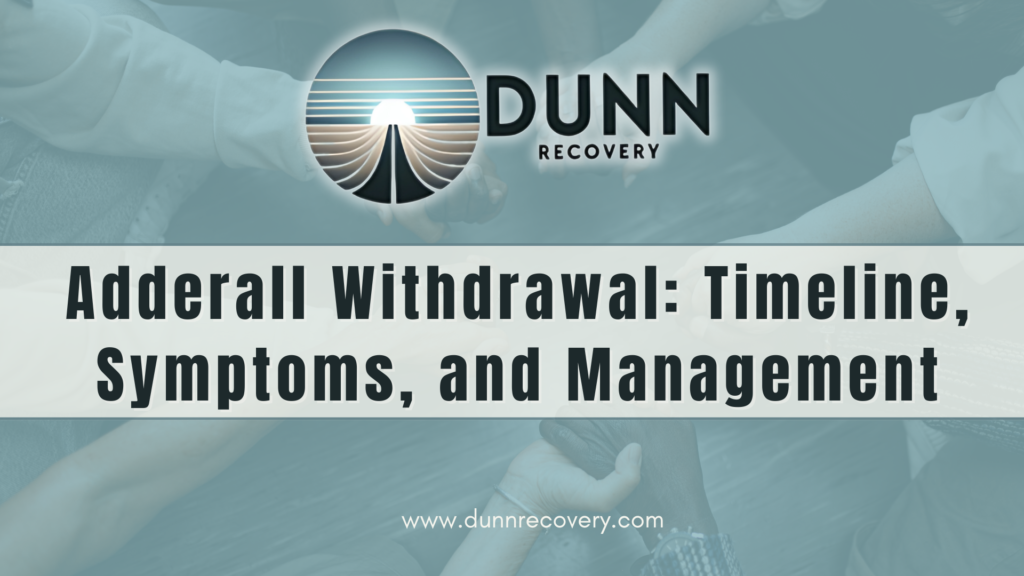In the challenging journey toward recovery from substance dependence, understanding the process of Adderall withdrawal is crucial for those seeking help. At Dunn Recovery, we recognize that knowledge empowers our clients to make informed decisions about their health and recovery journey. This comprehensive guide explores the timeline, symptoms, and effective management strategies for Adderall withdrawal, providing you with essential information to navigate this difficult but important phase of healing.
Adderall Addiction: Understanding the Foundation of Withdrawal
Adderall, a prescription stimulant medication primarily used to treat Attention-Deficit/Hyperactivity Disorder (ADHD) and narcolepsy, contains amphetamine and dextroamphetamine. These powerful components affect the central nervous system by increasing the availability of certain neurotransmitters like dopamine and norepinephrine in the brain.
When taken as prescribed, Adderall can effectively manage symptoms of ADHD. However, its stimulant properties and effects on the brain’s reward system make it susceptible to misuse and dependency. Over time, regular use can lead to tolerance, where higher doses are needed to achieve the same effects, potentially culminating in addiction.
Adderall Addiction Symptoms
Recognizing the signs of Adderall addiction is the first step toward addressing withdrawal. Common indicators include:
- Behavioral changes: Increasing dose without medical guidance, “doctor shopping” to obtain multiple prescriptions
- Psychological dependence: Feeling unable to function normally without the medication
- Social isolation: Withdrawing from family and friends to hide drug use
- Academic or work concerns: Declining performance despite initial productivity boosts
- Financial strain: Spending excessive money to obtain Adderall
- Physical symptoms: Sleep disturbances, decreased appetite, weight loss, and cardiovascular issues
At Dunn Recovery, our experienced clinicians are trained to identify these symptoms and develop personalized treatment plans that address both addiction and withdrawal concerns.
The Science Behind Adderall Dependency
Adderall works by increasing levels of dopamine, the brain’s “reward” neurotransmitter. With prolonged use, the brain adapts to these artificially elevated levels and begins producing less dopamine naturally. This neurochemical adaptation creates a physical dependency where the body requires Adderall to maintain normal functioning.
When someone suddenly stops taking Adderall after developing dependence, the brain experiences a significant dopamine deficit, triggering the uncomfortable symptoms associated with withdrawal.

Adderall Withdrawal Timeline: What to Expect
The withdrawal process from Adderall follows a relatively predictable timeline, though individual experiences may vary based on factors like:
- Duration of Adderall use
- Typical dosage
- Method of discontinuation (cold turkey vs. tapering)
- Individual health factors and metabolism
- Co-occurring mental health conditions
Understanding this timeline helps individuals and their support systems prepare for the challenges ahead and implement appropriate coping strategies.
Initial Phase (1-3 Days)
The first 72 hours after discontinuing Adderall often involve the most acute physical symptoms:
- Crash period: Extreme fatigue and increased sleep needs
- Appetite changes: Return of appetite, sometimes with intense hunger
- Mood disturbances: Irritability, anxiety, and mild depression
- Physical discomfort: Headaches and general malaise
During this critical initial phase, the clinical team at Dunn Recovery provides close monitoring and support to ensure client safety and comfort.
Early Withdrawal (4-7 Days)
As the body continues to adjust to the absence of Adderall:
- Sleep disruptions: Insomnia may replace initial fatigue
- Mood intensification: Depression and anxiety often peak
- Cognitive effects: Brain fog, difficulty concentrating, and slowed thinking
- Physical symptoms: Continued lethargy and possible muscle aches
Protracted Withdrawal (1-3 Weeks)
While acute physical symptoms begin to subside, psychological challenges often persist:
- Gradual energy return: Physical energy slowly improves
- Continued mood fluctuations: Depression may linger
- Cravings: Psychological urges to resume Adderall use may intensify
- Cognitive improvement: Mental clarity begins to return, though not completely
Post-Acute Withdrawal Syndrome (PAWS) (1-6 Months)
For some individuals, especially those with prolonged or heavy Adderall use, withdrawal symptoms may extend beyond the acute phase:
- Intermittent symptoms: Periodic returns of depression, fatigue, or cravings
- Trigger sensitivity: Stress or environmental cues may temporarily worsen symptoms
- Gradual improvement: Overall trending toward recovery with occasional setbacks
At Dunn Recovery, we recognize that this extended withdrawal phase requires ongoing support and have designed our aftercare programs to provide continued assistance throughout this challenging period.
Adderall Withdrawal Symptoms: A Comprehensive Overview
Understanding the specific symptoms of Adderall withdrawal helps individuals prepare for and cope with the challenges they may face. These symptoms typically fall into physical, psychological, and cognitive categories.
Physical Adderall Withdrawal Symptoms
The body’s adjustment to functioning without Adderall produces several noticeable physical effects:
- Fatigue and sleep changes: Extreme tiredness alternating with insomnia
- Appetite and weight changes: Increased hunger and potential weight gain
- Psychomotor agitation or retardation: Feeling physically slowed down or restless
- Pain and discomfort: Headaches, muscle aches, and general discomfort
- Cardiovascular adjustments: Changes in heart rate and blood pressure as the body adapts
Psychological Adderall Withdrawal Symptoms
The emotional and psychological aspects of withdrawal can be particularly challenging:
Adderall Withdrawal Depression
Depression during withdrawal is common and typically stems from both neurochemical changes and psychological factors. Symptoms may include:
- Persistent sadness or empty mood
- Loss of interest in previously enjoyable activities
- Feelings of hopelessness or worthlessness
- Thoughts of self-harm in severe cases (requiring immediate professional intervention)
Our therapists at Dunn Recovery employ evidence-based approaches to address depression during withdrawal, including cognitive-behavioral therapy and, when appropriate, non-addictive medication support.
Adderall Withdrawal Anxiety
Many individuals experience heightened anxiety during withdrawal, manifesting as:
- Excessive worry about recovery or future functioning
- Panic attacks
- Social anxiety
- General nervousness or feeling on edge
Mood Instability
Rapid mood swings are common during withdrawal and may include:
- Irritability and increased frustration
- Emotional oversensitivity
- Difficulty regulating emotional responses
- Periods of emotional numbness alternating with intense feelings
Cognitive Adderall Withdrawal Symptoms
The brain’s adjustment to functioning without Adderall produces several cognitive challenges:
- Concentration difficulties: Problems focusing on tasks that previously seemed manageable
- Memory issues: Short-term memory lapses and word-finding difficulties
- Executive function challenges: Problems with planning, organizing, and completing tasks
- Slowed thinking: Mental processes may feel sluggish or effortful
Managing Adderall Withdrawal: Effective Strategies for Recovery
At Dunn Recovery, we employ a multifaceted approach to Adderall withdrawal management, combining medical supervision, psychological support, lifestyle interventions, and long-term recovery planning.
Medical Approaches to Adderall Withdrawal
Professional medical supervision is crucial during Adderall withdrawal to ensure safety and maximize comfort:
Supervised Tapering
Rather than abrupt discontinuation, a gradual reduction in Adderall dosage under medical supervision can help minimize withdrawal symptoms. This approach:
- Allows the brain to adjust more gradually to changing neurotransmitter levels
- Reduces the intensity of physical and psychological symptoms
- Provides opportunities for adjustments based on individual responses
Supportive Medications
While there are no FDA-approved medications specifically for Adderall withdrawal, certain non-addictive medications may help manage specific symptoms:
- Sleep aids for insomnia
- Non-stimulant medications for attention and focus
- Mood stabilizers for emotional symptoms
- Anti-anxiety medications (carefully selected to avoid addictive potential)
Our medical team carefully evaluates each client’s needs to determine appropriate supportive medications while avoiding the creation of new dependencies.
Psychological Support During Withdrawal
The psychological aspects of Adderall withdrawal often present the greatest challenges to recovery and require specialized attention:
Individual Therapy
One-on-one therapy sessions at Dunn Recovery focus on:
- Developing personalized coping strategies for cravings and withdrawal symptoms
- Addressing underlying reasons for initial Adderall use
- Building motivation for continued recovery
- Processing emotions that emerge during withdrawal
Group Therapy
Shared experiences in a group setting provide:
- Validation and normalization of withdrawal experiences
- Peer support and accountability
- Opportunities to learn from others’ strategies and successes
- Reduction of isolation during a challenging time
Cognitive-Behavioral Approaches
Specific therapeutic techniques help manage Adderall withdrawal by:
- Identifying and challenging negative thought patterns about functioning without medication
- Developing healthier responses to stress and triggers
- Building confidence in natural abilities without chemical enhancement
- Establishing new routines and habits that support recovery
Lifestyle Interventions for Adderall Withdrawal
Practical lifestyle changes significantly impact the withdrawal experience and recovery outcomes:
Nutrition for Recovery
Dietary approaches that support brain health and energy levels include:
- Regular, balanced meals to stabilize blood sugar
- Foods rich in tyrosine (legumes, eggs, meat) to support natural dopamine production
- Omega-3 fatty acids to support brain health
- Adequate protein to provide amino acid building blocks for neurotransmitters
- Limiting caffeine and sugar, which can worsen mood swings and sleep issues
Physical Activity
Exercise provides numerous benefits during Adderall withdrawal:
- Natural endorphin release to improve mood
- Fatigue reduction and energy regulation
- Improved sleep quality
- Stress reduction
- Accelerated healing of brain reward pathways
Sleep Hygiene
Addressing the common challenge of Adderall withdrawal insomnia involves:
- Consistent sleep and wake times
- Creating a comfortable, dark sleep environment
- Limiting screen time before bed
- Relaxation techniques like deep breathing or progressive muscle relaxation
- Avoiding caffeine and other stimulants, especially later in the day
Managing Specific Challenging Symptoms
Certain withdrawal symptoms require targeted approaches for effective management:
Addressing Adderall Withdrawal Fatigue
The extreme tiredness that accompanies withdrawal can be managed through:
- Strategic rest periods throughout the day
- Gradual increase in activity levels
- B-vitamin supplementation for energy support
- Small, frequent meals to maintain energy levels
- Hydration and electrolyte balance
Coping with Adderall Crash
The initial crash phase when Adderall leaves the system can be particularly difficult. Strategies include:
- Creating a safe, comfortable environment for the first few days
- Having supportive people present
- Preparing easy, nutritious meals in advance
- Temporarily reducing responsibilities when possible
- Focusing on self-compassion during this challenging phase

Long-Term Effects of Adderall: Understanding the Importance of Recovery
Recognizing the potential long-term impacts of Adderall use reinforces the importance of professional withdrawal support and complete recovery.
Neurological Effects
Prolonged Adderall use can affect brain structure and function:
- Alterations in dopamine systems that may persist for months or years
- Changes in stress response systems
- Potential neurotoxicity with very high or prolonged use
- Cognitive adaptations that may require time to normalize
Cardiovascular Considerations
Stimulant medications like Adderall affect the cardiovascular system:
- Increased risk of high blood pressure
- Heart rhythm abnormalities
- Potential long-term cardiac stress
Psychological Impacts
Extended Adderall use can contribute to:
- Increased vulnerability to mood disorders
- Anxiety disorders
- Psychological dependence on medication for normal functioning
- Changes in self-perception and confidence in natural abilities
Adderall Addiction Treatment: The Path Forward After Withdrawal
Successfully navigating the withdrawal phase opens the door to comprehensive addiction treatment and sustained recovery.
Comprehensive Assessment
At Dunn Recovery, treatment begins with thorough evaluation:
- Medical history and physical examination
- Psychological and cognitive assessment
- Substance use patterns and triggers
- Co-occurring mental health conditions, including underlying ADHD
- Support system and environmental factors
Treatment Program Options
Based on individual needs, treatment options include:
- Inpatient rehabilitation: Intensive, residential treatment with 24-hour support
- Partial hospitalization: Structured daytime programming with evenings at home
- Intensive outpatient: Several treatment sessions weekly while maintaining normal life activities
- Outpatient services: Regular therapy and support while living at home
Addressing Co-occurring Conditions
Many individuals who develop Adderall dependency have underlying conditions that require attention:
- Alternative, non-stimulant treatments for ADHD
- Treatment for anxiety or depression
- Therapy for trauma or other contributing factors
- Development of non-pharmacological coping strategies for attention and focus challenges
Relapse Prevention Planning
Building sustainable recovery involves:
- Identifying personal triggers and high-risk situations
- Developing specific strategies for managing cravings
- Building a supportive community
- Establishing healthy routines and habits
- Regular follow-up and adjustment of recovery plans
FAQ Section: Adderall Withdrawal
How long does Adderall withdrawal last?
Acute Adderall withdrawal typically lasts 1-3 weeks, with the most intense symptoms occurring during the first week. However, some individuals may experience post-acute withdrawal syndrome (PAWS) with intermittent symptoms lasting up to 6 months, especially after long-term or high-dose use. At Dunn Recovery, our treatment programs account for both acute and post-acute phases of withdrawal.
What are the most common Adderall withdrawal symptoms?
The most common Adderall withdrawal symptoms include extreme fatigue, increased appetite, depression, anxiety, irritability, difficulty concentrating, and sleep disturbances including insomnia. Physical symptoms may include headaches, body aches, and a general feeling of unwellness. The specific combination and intensity of symptoms vary based on individual factors and use patterns.
Is Adderall withdrawal dangerous?
While Adderall withdrawal is typically not life-threatening, it can present serious challenges including severe depression and suicidal thoughts in some cases. Additionally, the extreme fatigue and cognitive impairment during withdrawal can lead to accidents or poor decision-making. Professional supervision during withdrawal, like that provided at Dunn Recovery, ensures safety and appropriate intervention if concerning symptoms develop.
How can I manage Adderall withdrawal insomnia?
Managing Adderall withdrawal insomnia requires a multifaceted approach including consistent sleep schedules, creating a comfortable sleep environment, limiting screen time before bed, relaxation techniques, and avoiding caffeine. In some cases, temporary non-addictive sleep aids may be prescribed under medical supervision to help re-establish healthy sleep patterns.
What is an Adderall crash and how long does it last?
An Adderall crash refers to the initial phase of withdrawal when the medication leaves the system, typically occurring within the first 1-3 days after discontinuation. Symptoms include extreme fatigue, increased sleep, hunger, and mood disturbances. The crash phase generally lasts 2-3 days before transitioning into the early withdrawal phase with different symptom patterns.
Can you reduce Adderall withdrawal symptoms by tapering?
Yes, gradually reducing Adderall dosage under medical supervision (tapering) can significantly decrease the intensity of withdrawal symptoms. Tapering allows the brain to adjust more gradually to changing neurotransmitter levels, reducing the shock to the system. Dunn Recovery’s medical team develops individualized tapering schedules based on each client’s specific use pattern and health needs.
What helps with Adderall withdrawal depression?
Adderall withdrawal depression can be managed through a combination of professional support, including therapy focused on cognitive-behavioral techniques, support groups, physical exercise, proper nutrition, adequate sleep, and in some cases, non-addictive antidepressant medications. Social connection and having a strong support system also play crucial roles in managing depression during withdrawal.
Is it possible to work or study during Adderall withdrawal?
Working or studying during Adderall withdrawal presents significant challenges due to fatigue, concentration difficulties, and mood disturbances. Some individuals may need to take time off or reduce responsibilities, especially during the first week. Others may manage with accommodations and reduced expectations. Dunn Recovery works with clients to develop realistic plans for managing responsibilities during the withdrawal period.
What are the symptoms of Adderall detox?
Adderall detox symptoms include physical manifestations like fatigue, increased appetite, headaches, and body aches, as well as psychological symptoms such as depression, anxiety, irritability, and intense cravings. Cognitive symptoms include difficulty concentrating, memory problems, and slowed thinking. These symptoms reflect the body and brain’s adjustment to functioning without the stimulant effects of Adderall.
When should I seek professional help for Adderall withdrawal?
Professional help for Adderall withdrawal is advisable if you’ve been taking high doses, have used Adderall long-term, have co-occurring mental health conditions, have previously experienced severe withdrawal symptoms, or have a limited support system. Additionally, if you experience severe depression, thoughts of self-harm, or inability to function during withdrawal, immediate professional intervention is necessary. Dunn Recovery offers comprehensive assessment to determine the appropriate level of care for safe and effective withdrawal management.
Conclusion: The Journey to Recovery at Dunn Recovery
The path through Adderall withdrawal, while challenging, represents a crucial step toward reclaiming health, authentic functioning, and overall well-being. At Dunn Recovery, we provide comprehensive, compassionate support throughout this journey, addressing not just the immediate symptoms of withdrawal but the underlying factors that contributed to Adderall dependence.
Our integrated approach combines medical expertise, psychological support, and practical lifestyle interventions to create a foundation for lasting recovery. We recognize that each individual’s experience with Adderall withdrawal is unique, and we tailor our approaches to meet specific needs and circumstances.
If you or someone you care about is struggling with Adderall dependence or facing the challenges of withdrawal, know that professional support can make a significant difference in both comfort and outcomes. The clinical team at Dunn Recovery is committed to guiding clients through this challenging transition and toward a healthier, more balanced future—one where success and well-being come from within rather than from a prescription.
Take the first step on your recovery journey by reaching out to Dunn Recovery today. Our compassionate admissions team is ready to answer your questions and help you access the support you need to navigate Adderall withdrawal successfully and build a sustainable recovery.

